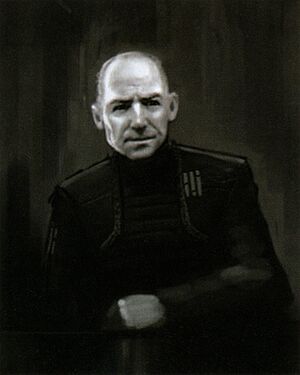Aleksis Kraulis
Aleksis Kraulis | |
|---|---|
 | |
| General Secretary of the Jedorian Communist Party | |
| Assumed office September 23rd, 1954 | |
| Preceded by | Position Established |
| Succeeded by | Alberts Vollis |
| Personal details | |
| Born | Aleksis Kraulis April 5th, 1908 Daugavbile, Bessarabia |
| Died | October 3rd, 1985 Lothas, Bessarabia |
| Spouse | Kersti Aasmae (1929-1978) |
Aleksis Kraulis (born Aptril 5th, 1908; Died October 3rd, 1985) was a Jedorian politician, statesman, and activist who ruled as General Secretary of the Socialist Republic of Jedoria from it's founding in 1954 to his death in 1985, for a total of 31 years. Born to a small rural family in the State of Bessarabia, Kraulis, a founding member of the Communist Party of Jedoria, helped to instigate the Jedorian Revolution that brought Jedoria under communist rule. As General Secretary Kraulis was the de facto single most powerful person in Jedoria, and ruled effectively as a dictator throughout his time in office.
After being elected by the Jedorian Worker's Council to the position of General Secretary in 1954, Kraulis embarked on a major industrialization and developmental initiative through Jedoria. This included the creation of the Jedorian highway network, the construction of the Luminovian Canal, and expansion of Jedoria's oil production facilities and capabilities. The Jedorian economy sustained consistent growth during his time in office, while his education, health, and social reforms are credited with drastically increasing the lifespan, literacy rates and educational opportunities of the Jedorian people. Kraulis aggressively promoted Jedorian communism in the international sphere, and his increased militarization and posturing saw Jedoria engage in a number of border conflicts with it's neighbors. Although originally supported by the Federation of Soviet Republics, Kraulis guided Jedoria away from the Soviets in the 60s after he suspected their Totalist ideology was becoming incompatible with Jedorian communism. Despite international controversy, Kraulis remained largely popular with the Jedorian people up until the 1980s. Following the death of his wife in 1979, Kraulis's health began to significantly deteriorate, possibly due to a degenerative neurological condition. He became paranoid and suspicious of others, even long time friends, and became obsessed with staving off what he thought was an impending foreign invasion. In 1983 he ordered the invasion of Mozria, which was carried out in 1985 and brought Jedoria into a wider war with the member states of the Able Vigil Accords. The Jedorians were decisvely defeated by the AVA and repelled from Mozria by September, and while stating he was prepared to carry on the war into Jedoria itself, Kraulis suffered a stroke in late September and was hospitalized. He died on October 3rd and was succeeded by Alberts Vollis, who sued for peace shortly thereafter.
Kraulis remains a controversial figure to this day and is vilified by many modern Jedorians. Although his reforms improved the living standards of most Jedorians, his authoritarian rule along with the imprisonment of political opponents and dissidents led many to label him a power hungry dictator, while his aggressive foreign policy led Jedoria into diplomatic isolation. His decision to pursue a war with Mozria and the fallout of that decision is widely believed to have triggered the decline of the Socialist Republic, which collapsed into civil war nearly 20 years after his death. Kraulis sired no children, and while he did not posses a strong cult of personality, he did encourage the promotion of himself as a grandfatherly figure to the Jedorian people, mostly in his later years. Several statues and monuments were built to Kraulis during his rule, though all were torn down or destroyed by the end of the civil war.